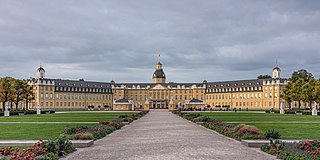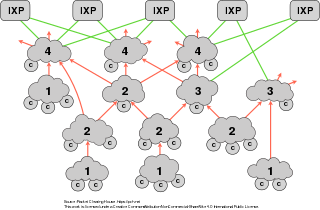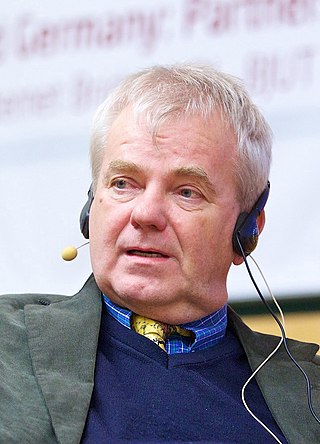Telecommunications in Kyrgyzstan include fixed and mobile telephones and the Internet.

Dial-up Internet access is a form of Internet access that uses the facilities of the public switched telephone network (PSTN) to establish a connection to an Internet service provider (ISP) by dialing a telephone number on a conventional telephone line which could be connected using an RJ-11 connector. Dial-up connections use modems to decode audio signals into data to send to a router or computer, and to encode signals from the latter two devices to send to another modem at the ISP.

An Internet service provider (ISP) is an organization that provides myriad services related to accessing, using, managing, or participating in the Internet. ISPs can be organized in various forms, such as commercial, community-owned, non-profit, or otherwise privately owned.

Karlsruhe is the third-largest city of the German state of Baden-Württemberg, after its capital Stuttgart and Mannheim, and the 22nd-largest city in the nation, with 308,436 inhabitants. It is also a former capital of Baden, a historic region named after Hohenbaden Castle in the city of Baden-Baden. Located on the right bank of the Rhine near the French border, between the Mannheim-Ludwigshafen conurbation to the north and Strasbourg to the south, Karlsruhe is Germany's legal center, being home to the Federal Constitutional Court, the Federal Court of Justice and the Public Prosecutor General.

XS4ALL was an Internet service provider (ISP) in the Netherlands. It was founded in 1993 as an offshoot of the hackers club Hack-Tic by Felipe Rodriquez, Rop Gonggrijp, Paul Jongsma and Cor Bosman, while based in Amsterdam. It was the sixth provider in the Netherlands and the second company to offer Internet access to private individuals. Initially only offering dial-in services via modem and ISDN, it later expanded to offer dial-up access as well as ADSL, VDSL, and fiber-optic (FTTH) services as well as mobile internet. The name is a play on the English pronunciation of access for all.
An online service provider (OSP) can, for example, be an Internet service provider, an email provider, a news provider (press), an entertainment provider, a search engine, an e-commerce site, an online banking site, a health site, an official government site, social media, a wiki, or a Usenet newsgroup.
Internet exchange points are common grounds of IP networking, allowing participant Internet service providers (ISPs) to exchange data destined for their respective networks. IXPs are generally located at places with preexisting connections to multiple distinct networks, i.e., datacenters, and operate physical infrastructure (switches) to connect their participants. Organizationally, most IXPs are each independent not-for-profit associations of their constituent participating networks. The primary alternative to IXPs is private peering, where ISPs directly connect their networks.
t-online.de is a German news portal, owned and published by digital multi-channel media company Ströer. It reaches over 179 million visits per month coming from 29 million unique visitors. The editorial team is located in Berlin.

Internet transit is the service of allowing network traffic to cross or "transit" a computer network, usually used to connect a smaller Internet service provider (ISP) to the larger Internet. Technically, it consists of two bundled services:

The World is an Internet service provider originally headquartered in Brookline, Massachusetts. It was the first commercial ISP in the world that provided a direct connection to the internet, with its first customer logging on in November 1989.

DE-CIX is an operator of carrier- and data-center-neutral Internet Exchanges, with operations in Europe, North America, Africa, the Middle East, India and Southeast Asia. All DE-CIX activities and companies are brought together under the umbrella of the DE-CIX Group AG.
Internet access is widely available in New Zealand, with 94% of New Zealanders having access to the internet as of January 2021. It first became accessible to university students in the country in 1989. As of June 2018, there are 1,867,000 broadband connections, of which 1,524,000 are residential and 361,000 are business or government.
The prevalent means of connecting to the Internet in Germany is DSL, introduced by Deutsche Telekom in 1999. Other technologies such as Cable, FTTH and FTTB (fiber), Satellite, UMTS/HSDPA (mobile) and LTE are available as alternatives.

Internet in Moldova is one of the fastest and least expensive in the world. The country ranks 3rd in the world by gigabit coverage with around 90% of the population having the option to subscribe to a gigabit plan. The overall infrastructure is well developed which allows many users to experience good quality services throughout the country. However, despite high speeds and cheap prices, the penetration level is quite low when compared with many EU or CIS countries. In 2018, 49% of Moldovan households had broadband access. In 2015, there were 80 registered Internet Service Provider's (ISP's) in the country, with the majority being local or regional with only a few offering their services throughout the country. Moldtelecom and StarNet are the country's leading providers sharing around 88% of the market. The remaining 12% are shared between other ISPS, like SunCommunications, Arax Communications and others. Almost all ISPs that offer their services across the country have their headquarters located in the capital-city of Chişinău.
The Internet in Serbia is well developed. The Internet country code top-level domain (ccTLD) for Serbia is .rs and .срб. (Cyrillic)

Iceland is among the top countries in the world in terms of Internet deployment and use. 99.68% of Icelanders used the internet in 2021.
Internet in Tajikistan became present within the country during the early 1990s. Tajikistan had just become independent in 1992, with Emomali Rahmon as the new ruler, when the internet was introduced to the country. Nevertheless, it was after over a decade that the country’s internet became more accessible. The history of the internet’s foundation in Tajikistan extends from 1992 to present-day Tajikistan. By 2009, internet penetration had developed since the initial conception of the internet in Tajikistan and Internet Service Providers (ISPs) had increased in number. In terms of the ISPs, Tajikistan primarily relied upon satellite-based connections using Discovery Global Networks.
The deployment of IPv6, the latest version of the Internet Protocol (IP), has been in progress since the mid-2000s. IPv6 was designed as the successor protocol for IPv4 with an expanded addressing space. IPv4, which has been in use since 1982, is in the final stages of exhausting its unallocated address space, but still carries most Internet traffic.
The Ohio Academic Resources Network (OARnet) is a state-funded IT organization that provides member organizations with intrastate networking, virtualization and cloud computing solutions, advanced videoconferencing, connections to regional and international research networks and the commodity Internet, colocation services and emergency web-hosting.

Werner Zorn is a German computer scientist and Internet pioneer.








